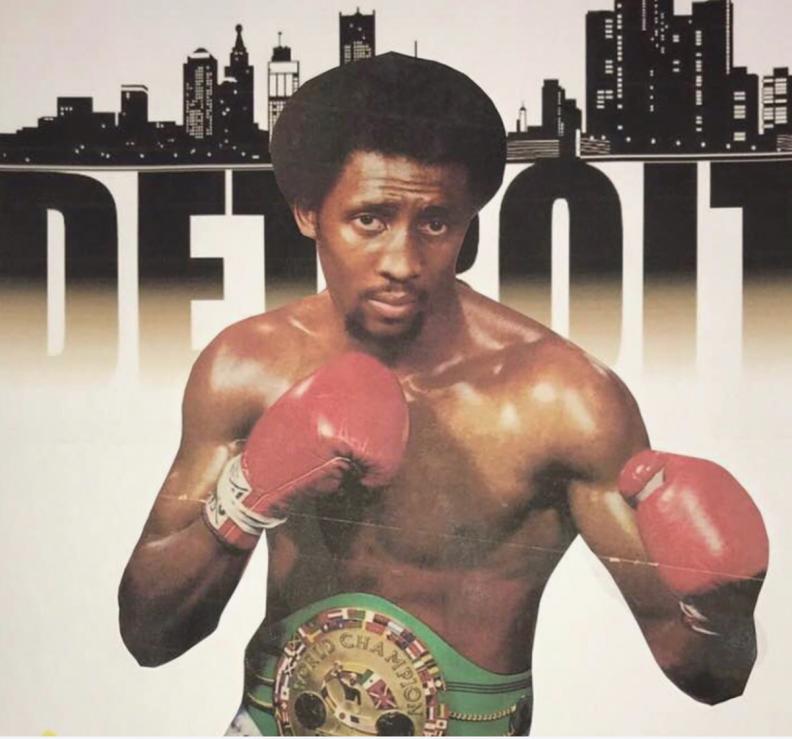
Thomas “Hitman” Hearns is a name that echoes through the halls of boxing history—a legend whose fists changed not only his own destiny but also the course of the sport itself. Yet, the story of Hearns is not just about championship belts, fame, and fortune. It is ultimately about a man who, after a lifetime of battles inside and outside the ring, left behind a legacy so profound that it brought his family to tears—not because of the millions he amassed, but because of the lessons and love he imparted.
Born on October 18, 1958, in Detroit, Michigan, Thomas Hearns was the youngest of nine children. His early life was shaped by hardship. Raised in a tough neighborhood where violence and poverty were daily realities, Hearns’s family struggled to make ends meet. His biological father was absent, and his stepfather worked as a janitor, barely able to provide for the large family. For young Thomas, food was often a luxury, and survival meant being tougher than the world around him.
Hearns’s childhood was marked by anger and trouble. School took a back seat to street fights and poor decisions. By his teens, he was on a path that seemed destined for prison or worse. But at 16, after a close brush with the law, Hearns made a decision that would change everything: he joined Job Corps, a federal program aimed at helping troubled youth. It was there, at a center in Oregon, that he discovered boxing—a sport that would not only save his life but also give him a reason to hope.
Under the guidance of coach Doc Brouse, Hearns began to channel his raw power and energy into the ring. Boxing gave him structure, discipline, and a sense of purpose. The troubled youth began to transform, dedicating himself to training and slowly emerging as a focused athlete. Coach Brouse saw Hearns’s potential and molded him into a fighter capable of reaching the highest levels.

In 1968, just two years after taking up boxing, Hearns earned a spot on the U.S. boxing team for the Mexico City Olympics. For Hearns, the Olympics were more than a competition—they were a chance to prove that a kid from Detroit’s streets could achieve greatness. His aggressive style and knockout power dazzled fans, and when he clinched the gold medal, it was a victory for every child who had ever struggled against the odds.
Turning professional in 1969 at the age of 20, Hearns quickly rose through the ranks. By 1980, he was a world champion, earning the WBA welterweight title after demolishing Pipino Cuevas in just two rounds. His ability to end fights with a single punch earned him the nickname “Hitman.” The money, fame, and endorsements soon followed. Hearns bought luxury cars, moved into lavish homes, and enjoyed the trappings of wealth—a world away from his humble beginnings.
But despite the external success, Hearns faced internal battles. The pressures of fame, the loneliness that came with it, and the emotional scars of his past never truly disappeared. Even as he dominated in the ring, defending his title against the likes of Ken Norton and Jose Roman, Hearns struggled with feelings of isolation and emptiness.
The defining moments of his career came in the early 1980s, with legendary fights against Sugar Ray Leonard, Roberto Duran, and Marvin Hagler. The 1981 showdown with Leonard was billed as the fight of the year. Hearns controlled the early rounds, but Leonard’s resilience saw him rally and stop Hearns in the 14th round. The loss was Hearns’s first and cost him his undefeated record and his aura of invincibility. The defeat triggered a period of self-doubt, but Hearns rebounded in 1984, knocking out Roberto Duran in two brutal rounds and reclaiming his place among boxing’s elite.
Yet, the wars in the ring took their toll—not just physically, but mentally. The fame, the losses, and the constant pressure wore on Hearns, affecting his relationships and mental health. The legendary 1985 fight against Marvin Hagler, often called one of the greatest rounds in boxing history, left Hearns with a broken right hand and a battered body, but also solidified his reputation as a warrior who never quit.
Despite earning millions throughout his career, Hearns’s financial life was fraught with trouble. Lavish spending, poor investments, and a lack of financial education led to bankruptcy in 2010. Hearns owed over $450,000, including back taxes to the IRS. The man who had once been one of the wealthiest fighters in the world now struggled to make ends meet. Yet, Hearns faced this crisis with humility and grace. He accepted responsibility, cut back on spending, and worked hard to rebuild his life, mentoring young fighters and focusing on his family.
Throughout all his struggles, Hearns’s devotion to his family never wavered. He was determined that his children would never endure the hardships he faced. As he reflected on his life, Hearns realized that the true legacy he wanted to leave was not just financial security, but wisdom, love, and values. He began writing personal letters to each of his children—letters filled with advice, memories, and lessons on perseverance, integrity, and humility. He reminded them that true wealth is measured not in dollars, but in character and relationships.
As he entered his 60s, the physical toll of decades in the ring became evident. Chronic pain and the effects of head trauma were constant reminders of his battle-hardened past. Knowing he could no longer fight, Hearns focused on securing his family’s future, setting up trust funds and organizing his estate. But the most precious inheritance he left was not his fortune—it was the blueprint for a meaningful life, captured in the heartfelt letters to his children.
When the time came for Hearns’s family to gather for the reading of his will, they were moved to tears—not just by the financial inheritance, but by the depth of love and wisdom in his letters. Hearns urged his children to live with integrity, to give back, and to cherish family above all else. His words, born from a life of struggle and triumph, became the true legacy he left behind.
Today, at 66, Thomas Hearns lives in retirement, at peace with his journey. His children, inspired by his example, carry forward his lessons of perseverance and humility. The “Hitman” may have left the ring, but his influence endures—in the boxing world, in his community, and most of all, in the hearts of his family. The fortune he left behind was more than money; it was a legacy of love, resilience, and wisdom that will guide generations to come.